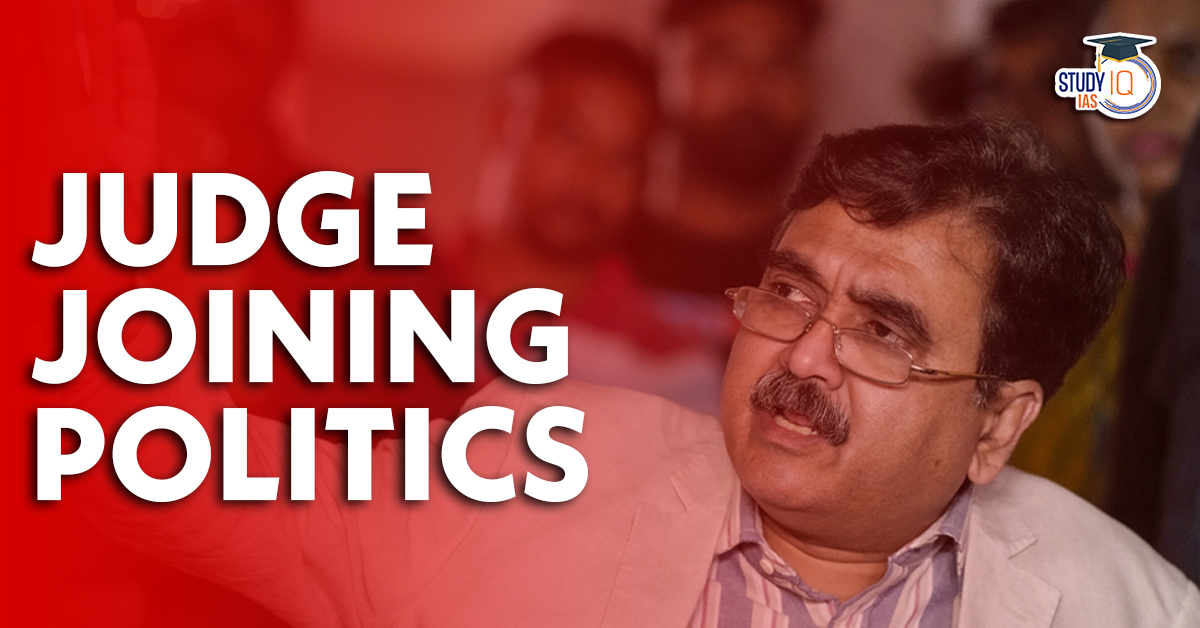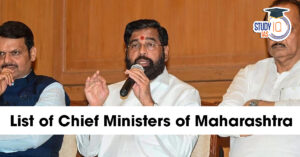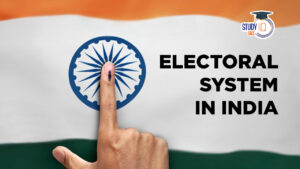Table of Contents
Context: Chief Justice of India B R Gavai has said that judges taking up government appointments “immediately after retirement” or resigning to contest elections “raises significant ethical concerns and invites public scrutiny”.
Concerns With Judges Joining Politics
- Violation of Oath: Constitutional functionaries swear to act without fear or favour. Political affiliations post-retirement raise doubts about their impartiality during service.
- Threat to Institutional Independence: Risk of judgments or decisions being influenced to gain future political rewards undermines the integrity of constitutional offices.
- Inconsistent Cooling-Off Period Norms: Civil Services Rules mandate a cooling-off period before joining private jobs, but there’s no such rule for political roles.
- Breach of Bangalore Principles (2002): Values such as impartiality, integrity, and propriety are compromised when judges enter political life soon after retirement.
- Loss of Public Trust: Judicial pronouncements (e.g., All India Judges’ Association v. Union of India, 1991) highlight how post-retirement roles may lead to erosion of public confidence in constitutional authorities.
Constitutional Restrictions on Post-Retirement Benefits
- Article 124(7): Retired Supreme Court judges are barred from practising law before any court or authority in India.
- Article 220: Retired High Court judges cannot appear before any court or authority except the Supreme Court or other High Courts.
- Article 148(4): The Comptroller and Auditor General (CAG) is ineligible for any future office under the Central or State government after retirement.
- Article 319: UPSC Chairman and Members are barred from taking up further government employment after demitting office.
| Examples of Judges Joining Politics |
|
Recommendations & Judicial Opinions
- Election Commission (2012): Suggested a post-retirement cooling-off period before bureaucrats can enter politics.
- Attorney General’s View: Supported cooling-off for private jobs due to conflict of interest, but opposed restrictions on political entry, citing democratic rights.
- Supreme Court (2022): Rejected a plea for imposing cooling-off periods, stating it’s a legislative matter.
Judicial Conduct and Expectations
Bangalore Principles of Judicial Conduct (2002)
- Core Values: Independence, impartiality, integrity, propriety, equality, competence, and diligence.
- Focus: Eliminate bias in decisions and maintain public trust in the judicial system.
- Restrictions:
- Judges cannot make public statements influencing ongoing cases.
- Recusal is mandatory when impartiality is compromised.
- Expected Behaviour: Conduct upholds the dignity and strengthens the image of the judiciary.
| Note |
Previous Instances
Supreme Court Cases
Opinions on Judges Entering Politics
Efforts to Ban Judges from Acquiring Executive Positions
|
Legal and Ethical Discussions
- Judgeship as a Sacrifice: Becoming a judge often means a significant personal sacrifice for lawyers, as it restricts their freedom and limits personal aspirations due to the necessity of maintaining judicial restraint.
- Despite these sacrifices, judges of constitutional courts enjoy certain powers and privileges not available to others, highlighting a unique aspect of their role.
- Impeachment Process: The Constitution, through Article 217 and Article 124(4), specifies that impeachment by Parliament is the sole method for removing a judge, a process known to be complex and rarely successful.
- High Court’s Authority: Article 215 grants High Courts the status of a court of record, with the power to enforce contempt of court, further emphasising the judiciary’s authority.
Opportunity for Judicial Reform
- This incident presents an opportunity for the Chief Justice of India and the Supreme Court to address judicial aberrations and reinforce ethical standards.
- There’s a call for the Supreme Court to explicitly forbid judges from engaging in politics post-resignation, aligning with the oath of office and global judicial conduct norms.
- The necessity for judge-made law on this issue is highlighted, given the unlikely action from Parliament on judicial conduct reform.
Way Forward
- Legislate a Cooling-Off Period: Parliament should enact a law mandating a minimum two-year cooling-off period before retired officials take up political roles.
- Raise Judicial Retirement Age: Increasing the retirement age to 70 can reduce incentives for post-retirement appointments.
- Criteria-Based Tribunal Appointments: Appointments should consider factors like nature of cases handled, judicial experience, and domain expertise.
- Promote Self-Regulation: Ethical restraint by individuals in high offices, as exemplified by Justices Chelameswar, Kurian Joseph, and former CJIs Kapadia, Lodha, and Thakur, should be the norm.


 List of Chief Ministers of Maharashtra F...
List of Chief Ministers of Maharashtra F...
 Electoral System in India 2026: SIR Upda...
Electoral System in India 2026: SIR Upda...
 SLAPP Suits: Meaning, Examples, Impact o...
SLAPP Suits: Meaning, Examples, Impact o...




















